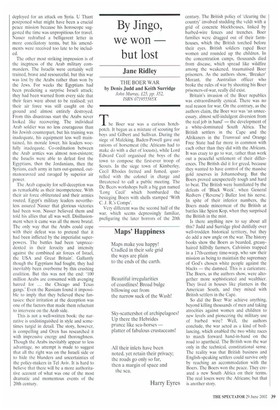By Jingo,
we won—
but lost
Jane Ridley
THE BOER WAR by Denis Judd and Keith Surridge John Murray, £25, pp. 352, ISBN 071955585X The Boer war was a curious hotchpotch. It began as a mixture of scouting for boys and Gilbert and Sullivan. During the siege of Mafeking, Baden-Powell gave out rations of horsemeat (the Africans had to make do with a diet of locusts), while Lord Edward Cecil organised the boys of the town to compose the first-ever troop of Scouts. In the siege town of Kimberley, Cecil Rhodes fretted and fumed, quarrelled with the colonel in charge and threatened to call a public meeting. The De Beers workshops built a big gun named 'Long Cecil' which bombarded the besieging Boers with shells stamped 'With C. J. R.'s Comps',
Very different was the second half of the war, which seems depressingly familiar, prefiguring the later horrors of the 20th century. The British policy of 'clearing the country' involved studding the veldt with a grid of concrete blockhouses, linked by barbed-wire fences and trenches. Boer families were dragged out of their farmhouses, which the British torched before their eyes. British soldiers raped Boer women and rounded up the children. In the concentration camps, thousands died from disease, which spread like wildfire among the weakened, traumatised Boer prisoners. As the authors show, 'Breaker' Morant, the Australian officer who broke the rules of war by shooting his Boer prisoners-of-war, really did exist.
Britain's invasion of the Boer republics was extraordinarily cynical. There was no real reason for war, On the contrary, as the authors claim, the Boer war was 'an unnecessary, almost self-indulgent diversion from the real job in hand' — the development of a white-dominated South Africa. The British settlers in the Cape and the Afrikaners in the Transvaal and Orange Free State had far more in common with each other than they did with the Africans. It was crazy to go to war, rather than work out a peaceful settlement of their differences. The British did it for greed, because they wanted to have control of the massive gold reserves in Johannesburg. But the Boers proved unexpectedly tough and hard to beat. The British were humiliated by the defeats of 'Black Week', when General Redvers ('Reverse') Buller lost his nerve. In spite of their inferior numbers, the Boers made mincemeat of the British at battles like Spion Kop, when they surprised the British in the mist.
Is there anything new to say about all this? Judd and Surridge plod dutifully over well-trodden historical territory, but they do add a new angle on the war. The history books show the Boers as bearded, greasyhaired hillbilly farmers, Calvinists trapped in a 17th-century time-warp, who saw their mission as being to maintain the supremacy of God's chosen white people against the blacks the damned. This is a caricature. The Boers, as the authors show, were altogether more sophisticated and wealthier. They lived in houses like planters in the American South, and they mixed with British settlers in the Cape.
So did the Boer War achieve anything, beyond killing thousands of men and taking atrocities against women and children to new levels and pioneering the military use of barbed wire? Well, the authors conclude, the war acted as a kind of boillancing, which enabled the two white races to march forward hand-in-hand on the road to apartheid. The British won the war only in the technical, constitutional sense. The reality was that British business and English-speaking settlers could survive only by reaching an accommodation with the Boers. The Boers won the peace. They created a new South Africa on their terms. The real losers were the Africans; but that is another story.


































































 Previous page
Previous page